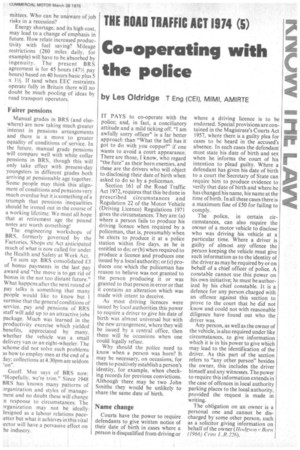THE ROAD TRAFFIC ACT 1974 (5)
Page 47

If you've noticed an error in this article please click here to report it so we can fix it.
Co-operating with the police
by Les Oldridge T Eng (CEO, MIMI, AMIRTE IT PAYS to co-operate with the police; and, in fact, a conciliatory attitude and a mild ticking off. "I am awfully sorry officer" is a far better approach than "What the hell has it got to do with you copper?" if one wants to avoid a court appearance. There are those, I know, who regard "the fuzz" as their born enemies, and these are the drivers who will object to disclosing their date of birth when asked to do so by a policeman.
Section 161 of the Road Traffic Act 1972, requires that this be done in prescribed circumstances and Regulation 22 of the Motor Vehicle (Driving Licence) Regulations 1971 gives the circumstances. They are: (a) where a person fails to produce his driving licence when required by a policeman, that is, presumably when he elects to produce it at a police station within five days, as he is entitled to do; or (b) when required to produce a licence and produces one issued by a local authority; or (c) produces one which the policeman has reason to believe was not granted to the person producing it or was granted to that person in error or that it contains an alteration which was made with intent to deceive.
As most driving licences were issued by local authorities this power to require a driver to give his date of birth was almost universal but with the new arrangement, where they will be issued by a central office, then there will be occasions when one could legally refuse.
Why should the police need to know when a person was born? It may be necessary, on occasions, for them to positively establish a person's identity, for example, when checking records for previous convictions. Although there may be two John Smiths they would be unlikely to share the same date of birth.
Name change
Courts have the power to require defendants to give written notice of their date of birth in cases where a person is disqualified from driving or where a driving licence is to be endorsed. Special provisions are contained in the Magistrate's Courts Act 1957, where there is a guilty plea for cases to be heard in the accused's absence. In such cases the defendant must state his date of birth and sex when he informs the court of his intention to plead guilty. Where a defendant has given his date of birth to a court the Secretary of State can require him to produce evidence to verify that date of birth and where he has changed his name, his name at the time of birth. In all these cases there is a maximum fine of £50 for failing to comply.
The police, in certain circumstances, can also require the owner of a motor vehicle to disclose who was driving his vehicle at a particular time. Where a driver is guilty of almost any offence the person keeping the vehicle must give such information as to the identity of the driver as may be required by or on behalf of a chief officer of police. A constable cannot use this power on his own initiative; he must be authorized by his chief constable. It is a defence for any person charged with an offence against this section to prove to the court that he did not know and could not with reasonable diligence have found out who the driver was.
Any person, as well as the owner of the vehicle, is also required under like circumstances, to give information which it is in his power to give which may lead to the identification of the driver. As this part of the section refers to "any other person" besides the owner, this includes the driver himself and any witnesses. The power to require this information extends in the case of offences in local authority parking places to the local authority, provided the request is made in writing.
The obligation on an owner is a personal one and cannot be discharged by some other person, such as a solicitor giving information on behalf of the owner (Hodgsonv Burn (1966) ('rim I.. R.226).




























































































